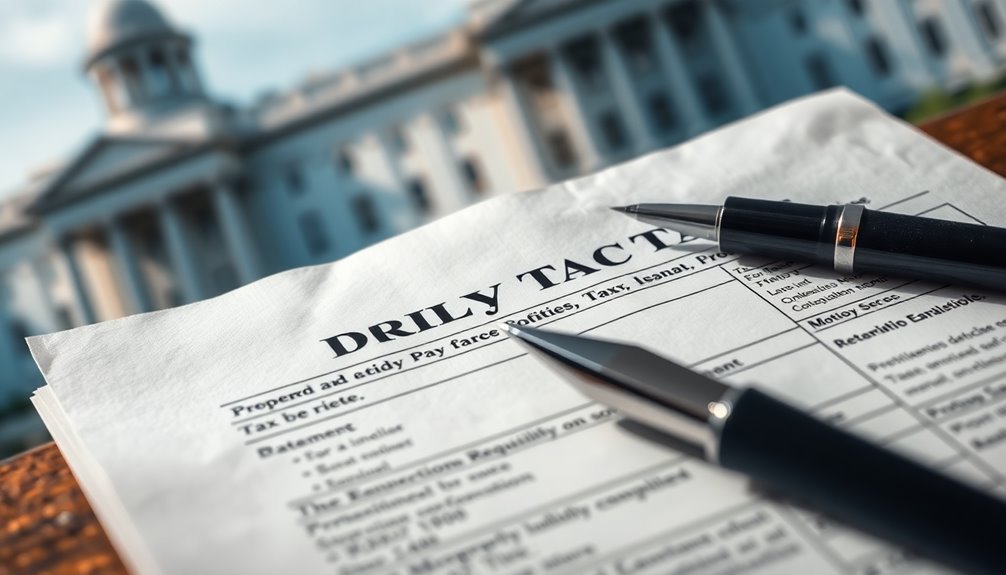Property taxes vary widely depending on your home's value and where you live. Most municipalities use a millage rate to calculate taxes, meaning you'll pay a certain amount per $1,000 of your property's assessed value. For instance, if your home's worth $200,000 and your local tax rate is 1.5%, you'd owe about $3,000 annually. Some areas, like Hawaii, have low effective rates, while others, such as New Jersey, can be much higher. Understanding these differences is crucial for effective budgeting, and there's plenty more to uncover about how various factors influence your property tax burden.
Key Takeaways
- Property taxes vary widely by location, influenced by local tax rates from counties, cities, and school districts.
- Tax rates are expressed in millage rates; 1 mill equals $1 per $1,000 of property value.
- Average property tax in Hawaii is around $937, while New Jersey averages between $8,597.69 and $12,690.70.
- Property taxes are calculated by multiplying the assessed property value by the total tax rate.
- Exemptions and abatements can lower the taxable value for qualifying individuals, impacting overall property tax amounts.
Understanding Property Tax Calculation

Understanding property tax calculation can feel daunting, but breaking it down into manageable parts makes it easier.
First, you'll need to determine your property value, which you can find on your Notice of Value or the central appraisal district website. Property values are typically assessed using various methods, including the market comparison, cost approach, and income approach. For residential properties, the market comparison method is common, where similar property sales are compared. Regular updates and reviews of property value are recommended to ensure accuracy.
Next, you need to identify the tax rates applicable to your property. Tax rates stem from different jurisdictions, such as Independent School Districts, counties, and cities. These rates can be expressed in millage rates, where one mill equals $1 for every $1,000 of your property's value.
To calculate your property taxes, multiply your property value by the total tax rate. For example, if your property's value is $10,000,000 and the tax rate is 2.5%, your tax bill would be $250,000.
Factors Affecting Property Taxes

Several factors influence property taxes, and knowing them can help you better prepare for your tax obligations. The assessed value of your property is a significant factor, determined by estimating its market value based on local real estate conditions. This assessment can use various methods, including sales comparison, cost estimation, or income assessment for commercial properties. Depending on your community, these assessments might occur annually or every few years.
Local tax rates and levies also play a crucial role. These rates combine local government needs from counties, cities, and school districts, expressed as a mill levy. One mill equals $1 for every $1,000 of assessed value. Your overall tax burden results from multiplying this rate by your property's assessed value. Property taxes are a primary income source for local governments, as they support essential infrastructure and services.
Additionally, budget appropriations affect how much revenue your local government needs to raise through taxes. Exemptions, such as those for seniors, can lower your taxable property value, while equalization rates ensure fair assessments across municipalities.
Finally, be aware that extra charges, like parcel taxes, could apply in your area, influencing your total property tax. Understanding these factors can help you navigate your property tax responsibilities more effectively.
State-by-State Tax Variations

Property tax rates can vary significantly from one state to another, impacting your overall tax burden. If you live in Hawaii, for example, you'll enjoy one of the lowest effective tax rates at just 0.28%-0.32%, translating to an average annual property tax of around $937.
Conversely, states like New Jersey impose much higher rates, ranging from 2.23%-2.49%, with average taxes soaring between $8,597.69 and $12,690.70.
Moderate tax rates can be found in places like California and Arizona, where rates hover around 0.68%-0.74% and 0.45%-0.62%, respectively. If you're in Iowa, be prepared for a higher tax rate of 1.40%-1.52%, which can lead to annual payments of up to $3,180.79. Property taxes are vital for supporting essential services such as schools and public safety in your community.
As you explore states with varying tax burdens, remember that the differences can significantly impact your finances. Knowing where you stand can help you make informed decisions about homeownership, budgeting, and even relocating.
Understanding these variations is crucial for better financial planning and managing your property investments effectively.
Local and County Tax Structures

Local and county tax structures play a crucial role in determining how much you pay in property taxes each year. Different jurisdictions, including cities, counties, and school districts, levy their own taxes, calculating separate tax rates that combine to form your total tax rate.
Special districts may also impose additional taxes for specific services, which you'll see reflected in your total tax bill.
Your property taxes are based on the assessed value of your property, including both land and buildings. Local assessors determine this value, often considering exemptions that can affect your tax bill. Tax rates are commonly expressed as a mill levy, where one mill equals $1 for every $1,000 of assessed value. Property tax rates vary significantly between New York City and other regions, impacting the overall tax burden homeowners face.
Local governments, such as city councils and school districts, decide how to allocate tax revenues, which primarily fund essential services like education, transportation, and emergency services.
Changes in budgets, revenues, and assessed values can lead to variations in your tax bill each year. If you believe your assessment is unfair, you may contest it, seeking a possible reduction in your property tax obligations.
Impact of Market Value

Understanding the impact of market value on your property taxes is essential for homeowners. Market value reflects what your property could reasonably sell for on the open market, influenced by recent sales, economic conditions, and buyer sentiment.
Unlike assessed values, which are determined by tax assessors and adjusted infrequently, market values can fluctuate significantly. When property values rise, tax assessors often reevaluate properties to align assessed values with current market conditions. This can lead to higher property taxes, especially if you're a newer homeowner who might face a much larger tax bill compared to long-term residents. Additionally, inflation can distort property values, causing tax assessments to increase even if your property's true market value hasn't changed.
It's crucial to monitor your property tax assessments closely. If there's a disparity between your assessed value and the current market value, you may want to contest the assessment. Furthermore, rising inflation can result in increased property tax assessments as higher asset values are reflected in tax calculations.
Assessment Ratios Explained

When you consider how property taxes are determined, assessment ratios play a crucial role in ensuring fairness in taxation. An assessment ratio is the relationship between the assessed value of your property and its fair market value. The local government assigns the assessed value for tax purposes, while the fair market value reflects the price your property would fetch on the open market. This assessment ratio is essential for calculating your property taxes, ensuring you pay a fair share based on your property's actual worth.
To calculate the assessment ratio, divide the assessed value by the fair market value. For instance, if your property has an assessed value of $100,000 and a fair market value of $200,000, the assessment ratio is 50%. This ratio can differ by property type or location and is often set by law. The assessment ratio determines your taxable value, which is then multiplied by the property tax rate to establish your tax bill. Variations in assessment ratios across jurisdictions can impact how much you pay, so it's important to understand how these ratios work to better navigate your property tax obligations.
Federal and State Regulations

Federal and state regulations play a vital role in shaping how property taxes are assessed and collected across the country. At the federal level, there's no overarching property tax; it's managed locally. While property leased to federal agencies might be subject to local taxes, the lessee's immunity can complicate tax responsibilities. Under certain lease agreements, the lessee may be viewed as the "true owner," possibly leading to tax exemptions.
State regulations add another layer of complexity. Many states enforce equalization requirements to maintain uniformity in property assessments. They can also limit annual tax increases to protect taxpayers and stabilize revenue. Additionally, states govern assessment procedures, often involving state boards and county equalization processes. This is crucial because property tax administration usually is handled separately by each jurisdiction, ensuring localized management.
Tax rates are calculated based on the total taxable assessed value of properties within a jurisdiction and vary widely across counties and municipalities. School districts and special districts establish their own rates, which can further complicate tax structures.
States also have established procedures for collecting delinquent taxes and allow property owners to dispute assessments through judicial review, ensuring a level of oversight and fairness in the property tax system.
Exemptions and Abatements

Property tax exemptions and abatements provide valuable opportunities for eligible homeowners and developers to reduce their tax burdens significantly.
If you're a senior aged 65 or older, a person with disabilities, or a veteran, you may qualify for exemptions that can lower your assessed property value by up to 50%. Programs like STAR and E-STAR can further help, offering annual savings of approximately $300 and $650, respectively, for eligible homeowners.
Abatements also offer financial relief, designed to stimulate development in specific areas. For instance, you could benefit from programs that eliminate or reduce property tax payments for new constructions or renovations. In cities like Portland, a 10-year property tax exemption is available for single-unit homes with improvements, while Cleveland provides a remarkable 85% to 100% tax abatement for rehabilitation projects. These programs encourage investment in specific neighborhoods, enhancing property appeal and potentially increasing resale value.
Budgeting and Revenue Impacts

Local governments heavily rely on property taxes for their revenue, making them a critical component of community funding. These taxes account for about 72.2% of local tax collections, generating roughly three in four local tax dollars nationwide.
With property taxes funding essential services like education, public safety, and infrastructure, your community's well-being is directly tied to this revenue source. In many states, property taxes are the largest source of combined state and local tax revenue, underscoring their importance.
However, budgeting pressures are mounting. As municipal budgets grow and non-property tax revenues shrink, local governments may feel compelled to increase property taxes, often exhausting their constitutional tax limits. This limits flexibility in funding and can jeopardize service levels.
Declining property values further constrain revenue, making it tough to maintain essential services. Fluctuations in property values can directly impact the availability of local services, while inequities in property assessments might lead to disparities in funding, particularly in education and public health.
Accurate assessments are vital to ensure fair funding. In essence, while property taxes provide stability compared to other revenue sources, they also present significant challenges that can affect the services you depend on in your community.
Future Trends in Property Taxes

As economic conditions continue to shift, you'll likely notice significant changes in property tax trends that can affect your community.
Inflationary pressures are driving local governments to increase property taxes, impacting your wallet. If home values decline, like the 1.7% drop seen nationwide in 2023, effective tax rates may rise, further straining your budget. In fact, the average tax on single-family homes has risen to $4,062, reflecting the 4.1% increase from the previous year.
You should also keep an eye on mortgage rates, as fluctuations can directly affect home values and subsequently your property tax obligations. States are increasingly considering reforms to address these rising costs.
For instance, Georgia voters will weigh in on a constitutional amendment limiting annual property tax increases to inflation rates.
Regional variations are also significant. For example, Illinois has a much higher effective tax rate than Hawaii, and metro areas can experience drastic tax changes based on local economic conditions.
Looking ahead, a real estate market rebound could stabilize or even lower effective tax rates if home values outpace tax increases.
Ultimately, the future of property taxes will hinge on political actions, legislative reforms, and how well local economies adapt to these evolving factors.
Be prepared to navigate these changes as they unfold.
Frequently Asked Questions
How Can I Appeal My Property Tax Assessment?
To appeal your property tax assessment, start by gathering evidence that shows your assessed value is too high.
Research recent sales of similar properties and consider getting a professional appraisal.
Review your property record for errors and contact your local assessing official for the appeal process.
File a written complaint with the county board of review, submit your evidence, and be prepared to present your case during a hearing.
What Happens if I Don't Pay My Property Taxes?
If you don't pay your property taxes, you'll face serious consequences. A tax lien gets placed on your property, and you'll accrue penalties and interest on your unpaid balance.
This can negatively impact your credit score, making it harder to secure loans. If the situation persists, your lender might pay the taxes and add that amount to your mortgage, potentially leading to foreclosure.
It's crucial to address unpaid taxes promptly to avoid these issues.
Are Property Taxes Deductible on Federal Income Tax Returns?
Yes, you can deduct property taxes on your federal income tax return, provided they're levied for general public welfare. This includes taxes on your main residence, vacation homes, and certain rental properties.
However, keep in mind that the total deduction for state and local taxes, including property taxes, is capped at $10,000.
To benefit, you'll need to itemize deductions on Schedule A of Form 1040.
Can Property Taxes Increase if Home Value Decreases?
Yes, property taxes can increase even if your home's value decreases.
This happens due to local government policies, market trends, and budget needs that affect overall tax assessments. If recent home sales in your area reflect rising values, your taxes might rise regardless of your property's value drop.
Additionally, unless you appeal or qualify for exemptions, your tax bill may not adjust downward even if your home's value declines.
How Do Property Taxes Affect Home Insurance Rates?
Property taxes don't directly affect your home insurance rates.
Instead, insurance premiums depend on the cost to rebuild your home, which can rise due to inflation or changes in materials.
While higher property tax appraisals might reflect your home's market value, they won't influence your insurance costs.
It's essential to keep your coverage aligned with current rebuild costs to ensure you're adequately protected, regardless of the property tax situation.
Conclusion
In conclusion, understanding property taxes is crucial for any homeowner or potential buyer. By grasping how property taxes are calculated and the various factors that influence them, you can better prepare for your financial obligations. Keep an eye on local and state regulations, as well as potential exemptions that could ease your burden. As the housing market evolves, staying informed will help you navigate future trends and make smarter decisions about your property investment.









